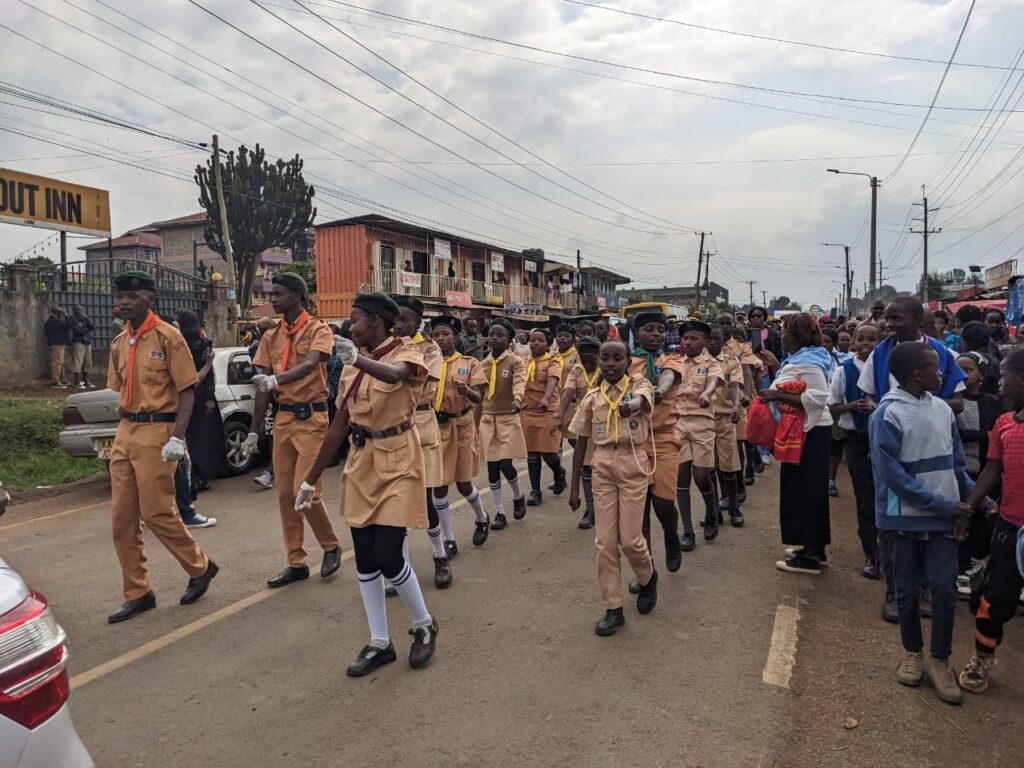NDUMBERI, KIAMBU COUNTY – On Tuesday, July 15, 2025, the quiet village of Ndumberi was shrouded in grief as hundreds gathered to mourn the loss of Bridgit Njoki Wainaina, a 12-year-old girl whose life was cut short by a stray police bullet during the violent Saba Saba protests on July 7.
The somber funeral service, held at Our Lady of Fatima Catholic Church, brought together family, friends, schoolmates, and prominent leaders, all united in sorrow and outrage over the tragic incident. Bridgit, a Grade Seven pupil, was watching television in the safety of her family’s home in Ndumberi when a bullet, allegedly fired by police during a confrontation with protesters, pierced through the house wall and struck her in the head. A post-mortem report conducted at St. Teresa Hospital in Thindigua confirmed that she died from a traumatic brain injury caused by a single gunshot wound, sparking widespread condemnation and renewed calls for police accountability across Kenya.
The funeral service, presided over by Catholic priests, was a deeply emotional affair. Mourners, including Bridgit’s classmates and teachers, wept openly as they paid their final respects. The presiding priests maintained a solemn atmosphere, prohibiting politicians from addressing the congregation from the podium to keep the focus on Bridgit’s memory and the family’s grief. However, the presence of notable figures, including presidential candidate Dr. Fred Matiang’i and Jubilee Secretary-General Jeremiah Kioni, underscored the national significance of the tragedy.
Dr. Matiang’i, speaking to the media outside the church, strongly condemned the excessive use of force by the police, describing Bridgit’s death as a “painful reminder of the reckless militarization of protest response in Kenya.” He warned that the incident could foreshadow more such tragedies if systemic issues within law enforcement are not addressed. “No child should lose their life in their own home. This is a failure of those meant to protect us,” he said, echoing sentiments of anger and frustration shared by the community.
Jubilee SG Jeremiah Kioni, alongside other leaders such as Wiper party leader Kalonzo Musyoka and former Defence Cabinet Secretary Eugene Wamalwa, expressed solidarity with Bridgit’s family and called for an independent investigation into the use of live bullets during the protests. “What happened in Kiambu must serve as a wake-up call. We cannot allow such occurrences to become the norm,” Kioni stated, highlighting the need for accountability to prevent future tragedies.
Bridgit’s mother, Lucy Ngugi, was inconsolable throughout the ceremony, supported by family and friends as she grappled with the loss of her daughter. Speaking to a local TV station the previous week, she had recounted the harrowing moment when the bullet struck Bridgit: “We thought we were safe in our home, far from the chaos. How could this happen to my child?” Her words resonated with mourners, many of whom carried placards demanding justice and an end to police violence.
The procession moved from the church to the family’s home in Kiriguini, Ndumberi, where Bridgit was laid to rest in a small white casket. The atmosphere remained heavy with grief, with community members standing united in their call for justice. Activists and human rights organizations, including the Kenya National Commission on Human Rights (KNCHR) and the Law Society of Kenya-Kiambu chapter, reiterated demands for a transparent investigation into Bridgit’s death and the broader use of lethal force during the Saba Saba protests, which claimed at least six lives in Kiambu alone.
Bridgit’s death has reignited national outrage over police conduct, with many pointing to the incident as emblematic of a broader pattern of excessive force during protests. Social media posts reflected the public’s anguish, with users expressing anger and frustration. One post described a police convoy visiting Bridgit’s family home, purportedly to offer condolences, but the gesture was met with skepticism and tears from her grieving mother.
As Ndumberi mourns, Bridgit’s family and the wider community continue to seek answers. “I’ll bury Njoki, but I’ll never forget the Saba Saba Day. Let Njoki be the last sacrifice of these protests,” Lucy Ngugi said in a statement that has become a rallying cry for those demanding reform. The tragedy has not only left a void in the hearts of those who knew Bridgit but has also intensified calls for systemic change to ensure that no other family endures such a devastating loss.
